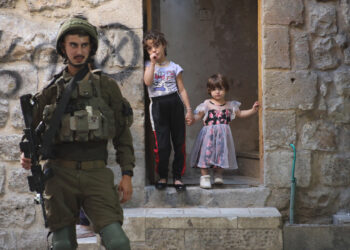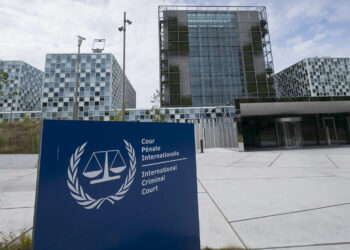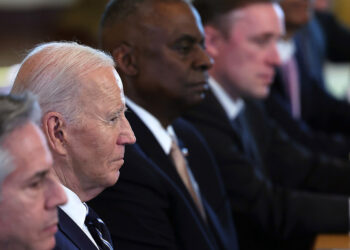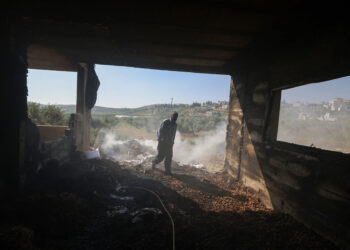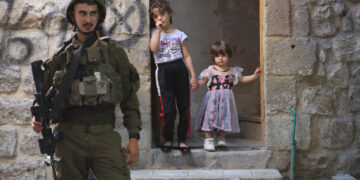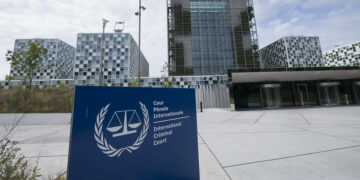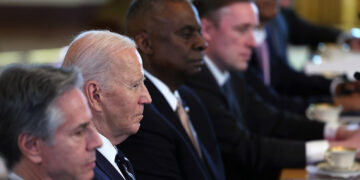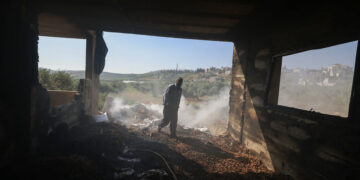Heidi Matthews is an assistant professor of law at Osgoode Hall Law School at York University in Toronto. She researches and teaches in the areas of the law of war, international criminal law, criminal law, and law and sexuality.
While both the International Court of Justice and the International Criminal Court sit in The Hague, they have very different responsibilities within the international legal system. Several major cases involving Israel's war in Gaza are testing the scope of those responsibilities in the face of war crimes, crimes against humanity and possible genocide. The ICJ, the so-called "world court," decides contentious disputes between states and delivers advisory opinions on legal questions posed by international governmental organizations. The ICC prosecutes individuals accused of war crimes, crimes against humanity, genocide and the crime of aggression.
The longest-running matter concerning the Israel-Palestine conflict writ large is the criminal investigation into the situation in Palestine at the ICC. In March 2021, the then-chief prosecutor of the ICC, Fatou Bensouda, opened an investigation into alleged crimes committed both on occupied Palestinian territory and by Palestinians dating back to June 2014. But it wasn't until this past month, on May 20, that Bensouda's successor, Karim Khan, announced that he was seeking arrest warrants against both Israeli and Hamas leaders. A pre-trial chamber of the ICC is now assessing whether there are reasonable grounds to believe that Israeli Prime Minister Benjamin Netanyahu and Minister of Defense Yoav Gallant, along with Yahya Sinwar, Mohammed Deif and Ismail Haniyeh, have committed war crimes and crimes against humanity since the Hamas-led attack into southern Israel on Oct. 7 and Israel's subsequent war of retaliation in Gaza.
In his request for warrants for Netanyahu and Gallant, Khan alleges that Israel is using starvation as a method of warfare. Specifically, Israel "has intentionally and systematically deprived the civilian population in all parts of Gaza of objects indispensable to human survival" for the purpose of, in part, collectively punishing all Palestinians in the Gaza Strip. Netanyahu and Gallant are also accused of responsibility for intentional attacks against civilians, murder, extermination and persecution, as well as other war crimes and crimes against humanity.
Major cases involving Israel's war in Gaza are testing the scope of the ICJ and the ICC's different international legal responsibilities, in the face of war crimes, crimes against humanity and possible genocide.
- Heidi Matthews
The crime of genocide is absent from the ICC prosecutor's application—particularly notable in light of the case that South Africa has brought against Israel at the ICJ, alleging Israel is committing genocidal acts as part of its military operations in Gaza. South Africa alleges that Israel has killed Palestinians, caused them serious mental and bodily harm, inflicted on them conditions of life calculated to bring about their destruction, and imposed measures to prevent births — all with the specific intent to destroy Palestinians in Gaza, a protected national, ethnic, racial or religious group, in whole or in part, according to the Genocide Convention.
Crucially, in January, the ICJ found that there was "a real and imminent risk that irreparable prejudice will be caused" to the right of Palestinians in Gaza to be protected from genocide. In other words, the court determined that, at a minimum, there is a serious risk that Israel is committing or will commit genocide in Gaza.
The ICJ's finding of a serious risk of genocide in Gaza is important because it formally triggered the obligation of all 152 states that are party to the Genocide Convention "to employ all means reasonably available to them, so as to prevent genocide so far as possible," as the court ruled in a 2007 case on Bosnian genocide. The duty of other states to act to prevent genocide comes into being "at the instant that the State learns of, or should normally have learned of, the existence of a serious risk that genocide will be committed," according to its 2007 ruling. The ICJ's January order thus put states—especially those with strong political, economic and military links with Israel, and therefore the capacity to effectively influence Israeli leaders—on notice that they have a duty to act to prevent genocide in Gaza.
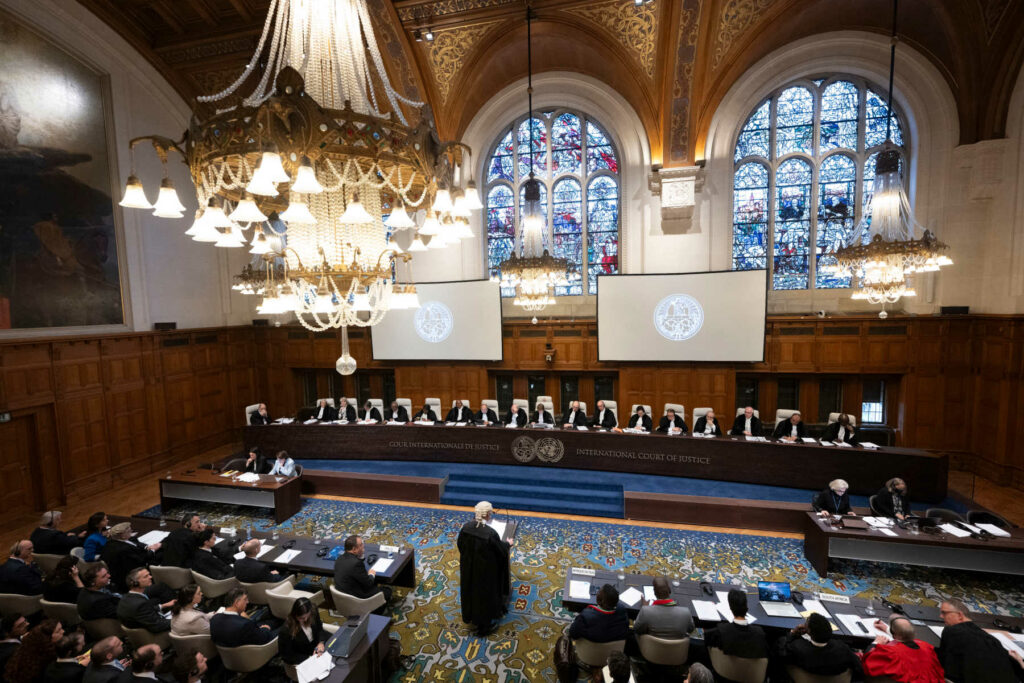
In March, Nicaragua brought a case against Germany at the ICJ based in part on the allegation that, as a state with a "self-proclaimed privileged relationship" to Israel, Germany has failed in its duty to prevent genocide in Gaza. It has done so, Nicaragua argues, by providing "political, financial and military support to Israel fully aware at the time of authorization" that such support would facilitate the commission of genocide and other serious international law violations.
While the Nicaragua case has been comparatively underreported in the international media, it is in fact the case with the widest reaching legal implications for states worldwide that are providing political, diplomatic, military and other forms of material support to Israel. In its response to Nicaragua, Germany relied on what it calls its "robust" domestic licensing procedure for military equipment, arguing it "carefully assesses whether there is a clear risk" that items licensed for export "would be used in the commission of genocide, crimes against humanity or grave breaches" of the Geneva Conventions. The ICJ appeared to give substantial weight to Germany's claims, as it declined to order provisional measures against the German government.
However, later the same month, the ICJ issued a second round of provisional measures against Israel in South Africa's genocide case, "in view of the prolonged and widespread deprivation of food and other basic necessities to which the Palestinians in the Gaza Strip have been subjected." Specifically, the court ordered Israel to ensure the "unhindered provision at scale … of urgently needed basic services and humanitarian assistance, including food, water, electricity, fuel, shelter, clothing, hygiene and sanitation requirements, as well as medical supplies and medical care" across Gaza.
Most recently, in May, the ICJ issued a third round of provisional measures, in which it ordered Israel to immediately end its military offensive in Rafah, in southern Gaza. In so doing, the court determined that the humanitarian situation in Rafah, where more than a million Palestinians displaced from other parts of Gaza have sought shelter, "is now to be characterized as disastrous," thus putting Palestinians in Gaza at a heightened risk of genocide. The ICJ expressed particular concern for the welfare of some 800,000 Palestinians who, as of mid-May, had been displaced from Rafah by Israel's military offensive, noting that Israel had not provided evidence capable of addressing the concern that they were being displaced to areas unfit for human habitation.
Khan's application for arrest warrants and the ICJ's orders for provisional measures together expose the organizing logic of Israel's war: to deliberately deprive Palestinians in Gaza of "objects indispensable to human survival."
- Heidi Matthews
Israel is now operating militarily in parts of southern Gaza where, for the first seven months of its military campaign, it had directed Palestinians to go to ensure their safety —so-called "safe zones" that are anything but. In the days since the ICJ's most recent order, Israel has only intensified its attacks on Rafah, with horrific consequences for the 1.4 million Palestinians who had been seeking refuge there. Only 65,000 people remain in Rafah, according to the United Nations, underscoring the scale of mass displacement caused by the Israeli military—in many cases involving Palestinians who have been displaced multiple times since the war began. According to the U.N. World Food Program, a million Palestinians in southern Gaza are now "trapped in a highly congested area along the beach in the burning summer heat" without clean water or sanitation.
The days since Khan's announcement of warrant requests have seen some of the bloodiest attacks in Gaza to date. Just two days after the ICJ ordered Israel to stop its attack on Rafah, Israel bombed a camp for displaced persons in Rafah, killing at least 49 Palestinians and injuring more than 180, in what immediately became known as the "tent massacre." On June 8, in the course of an operation to rescue four hostages, Israeli forces indiscriminately bombed and fired on a marketplace in Nuseirat, in central Gaza, reportedly killing at least 274 Palestinians and injuring more than 700.
Although the ICJ and ICC are independent institutions with distinct mandates, Khan's application for arrest warrants and the ICJ's series of orders for provisional measures together expose the organizing logic of Israel's war: to deliberately deprive Palestinians in Gaza of "objects indispensable to human survival." In addition to forming the basis for the crime of starvation as a method of warfare, such deprivation, including of food and medical services and the systematic expulsion from homes, can under international law constitute the deliberate infliction of conditions of life calculated to bring about the physical destruction of a protected group, in whole or in part—a genocidal act.












